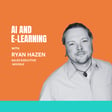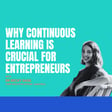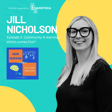Become a Creator today!Start creating today - Share your story with the world!
Start for free
00:00:00
00:00:01

The Intersection of Mental Health and Learning
In the latest episode of the Gamoteca Podcast, our host, Lauren Anderson Brown, sits down with Ben Evans, founder of Human Talk, to explore the integral connection between mental health, well-being, and the learning experience. With mental health emerging as a key consideration in leadership and team development, Ben offers insights into how organisations can create supportive, human-centred learning environments.
Find more about Ben Evans
Website: https://www.humantalk.co.uk
LinkedIn: https://www.linkedin.com/in/bentimothyevans
Transcript
00:00:00
Speaker
Mental health is becoming a key consideration when developing the next generation of leaders and business executives. But mental health can't just be taught. It has to be learned, and how it's learned differs from other click-through e-learning experiences. I'm Lauren Anders-Brown, your host for this episode, and we're going to explore more about this topic with our guest speaker, Ben Evans.
00:00:24
Speaker
You're listening to How Humans E-Learn Together, discussing the impact human-connected interactive experiences have on the human capacity to learn. This is a podcast for educators, learning and development professionals, coaches and mentors, the technology and design community, and anyone who wants to leverage new ways to reach lifelong learners, and a look at what others in the e-learning industry are doing to make that happen. I'm here listening today to Ben Evans,
00:00:54
Speaker
Hi. I say listening because that's a huge component of what we're going to talk about today. Human connection, mental health, e-learning for coaching and development. What learning means to us actually as humans and not just to ourselves in terms of being able to progress and learn new skills, but actually how other people are often invested in your learning too and they want to see you learn and grow and and progress. Ben works for human talk.
00:01:21
Speaker
ah So actually I'm the founder of HumanTalk which means I've only got myself to blame, right? um but You know, is there anything that's happening right now is is by my design. um But you know, at HumanTalk, we're really committed um to bringing together the disciplines of leadership development, team development, and mental health and wellbeing. And for us, for me and the team, these are really the three essential dimensions of effective and sustainable learning and performance, right? Which is what most of our clients seem to care about.
00:01:53
Speaker
Let's get started with this conversation about how these things are connected and obviously connected to humans. So can you describe the connection between mental health, wellbeing, and how learning plays a role in that?
00:02:06
Speaker
For me, um a great place to start with this sort of interaction is with into wellbeing, which was done way back in 2008 by an organisation called the New Economics Foundation. And what this study concluded was that for us humans, there are five essential actions which we can take to help us live and feel well.
00:02:27
Speaker
connecting with others, physical activity, taking notice or being mindful, as we might put it, giving to others, and finally, learning. Now, interestingly to me, we often seem to miss out that last one of learning. When I speak to lots of people about mental health and wellbeing, a lot of people now know that physical activity is good for you, that social connection is good for you. But this last one, learning, isn't so obvious.
00:02:54
Speaker
And yet when we dig into what learning can do for mental health and wellbeing, we can see just how important it is. And this got me thinking about actually that learning or the process of learning is good for mental health as well as the outcomes of learning, which can benefit our mental health. So so let me tell you a bit more about that. If the learning experience is an engaging one, and that's a big if, right? If it's engaging, then when we're learning something, we get the benefits of focus,
00:03:22
Speaker
of immersion in an activity, we get the joy of the experience itself. And we might experience what some psychologists would call being in a state of flow when we're totally absorbed in the experience for the sake of the experience, not for the outcomes. And that's been proven to be really good for mental health.
00:03:40
Speaker
And then I think about actually the outcomes that we get as a result of a learning experience. So if it's been a beneficial experience, we get improved skill levels, right? And that can lead to improved confidence, which can open up new opportunities, which can help us get unstuck in our careers and perhaps even improve our relationships. All of these things are really good for performance, but they're actually really good for our mental health and wellbeing as well. So for me, I think the research is really clear. Learning is integral to what it means to function and live well as a human being. There's lots of ways that people learn I guess nowadays. My learning for example is online or asynchronous you know it's not always with a human in the room but could you tell us the significance of live real-time interactions in learning and why specifically for mental health this is actually important for support?
00:04:33
Speaker
actually a human tool we're we're fans of both methodologies if if that makes sense so we are fans of on-demand learning so you know what some people might call asynchronous as as you've mentioned do it in your own time you do it by yourself but we're also massive fans of the live interactive experiences where it's happening in real time with with other people And it might be worth just sort of drawing out the benefits of both methodologies. So as people are working out how to package some of their learning experiences, there are benefits to both. Very briefly, you know, the real benefits for someone's mental health for having sort of on-demand learning is you do it in your own time, in your own environment, at your own pace.
00:05:11
Speaker
Sometimes people can feel, you know, the social interactions that come with live sort of learning interactions. Sometimes that can be pressure for people depending on where they're at with their mental health, um if they have social anxiety, for example. So I'm not going to be anti on-demand learning because for some of us um of the time, right, it's it's a really helpful way to learn.
00:05:31
Speaker
However, we're also massive fans of the benefits that come from live interactive learning experiences. and And I think there's three kind of main benefits for our mental health, I think, that come out of that. The first one, as as I mentioned in the research earlier on, we know that social interaction in of itself is good for us. So we're going to get some of that through to a live interactive experience. Secondly, I think when we learn with others,
00:05:58
Speaker
I often find that people are encouraged by being with other people who have similar challenges to themselves. And often I find that this leads to people being less self-critical. And I've noticed, it's not just me, I don't think, but I've noticed a lot of learners, but I definitely have this in spades. I've notice noticed that learners can often be very self-critical. We can be hard on ourselves for having to learn something because it's telling us we don't yet know it, or perhaps it takes a bit longer for us to learn something than we think it should.
00:06:26
Speaker
So when you're learning by yourself, that whole kind of self critical thing can really magnify. when you're learning with others and you realise hey these other people also have these struggles or feel this imposter syndrome or are unsure on this technical sort of skill as well, that can actually provide great evidence which counters our self-criticism. We see that it's not only us, we're all learners, we're all in it together. And the third reason I think why the live interaction model is is a really good one is that you get the benefit of having another human being
00:06:57
Speaker
the trainer, the facilitator, the coach, who's there not only to impart some knowledge to help you learn some content, but actually good trainers and facilitators are also there to look out for you as a learner, to observe how you're getting on with the content, to observe your interactions with others.
00:07:15
Speaker
And actually, if i us as trainers and facilitators are doing a job properly, we should be creating a really engaging supportive learning environment, which I think you can only get when humans get together. It's quite hard to have a supportive environment if you're sitting by yourself clicking next to continue, you know, for an hour and a half or whatever it might be. Absolutely. i You know, this reminds me of um there's a saying that I love that I've heard before, ah you know, improving your mental health is like lifting mental weights.
00:07:44
Speaker
And you know it's kind of the difference between going to the gym and trying to kind of. do things on your own, right? Like, you know, dedicating yourself to running on the treadmill to lifting, doing a certain weight routine, you know, and people can do that. Like I lived with a roommate who was like so easy for her to go and do that on her own. Whereas some people actually need a trainer, like they need a trainer, not because they need to be like a top athlete or they have a huge event coming up, but just because that's, that's their accountability. That's their interaction. And that's the healthiest way for them to stay healthy.
00:08:17
Speaker
is by having someone who helps them lift those mental weights rather than just doing it by themselves. Yeah, and do you know that that makes me think of the concept of mental fitness, which is a term we really like at HumanTalk because mental health can sometimes feel a little bit like we're talking about illness or diagnosable conditions, and of course, those are all relevant. But actually, mental fitness, what do I need to help me be mentally fit so I can learn and perform and grow?
00:08:43
Speaker
And yeah, then that idea of having a coach or someone to cheat cheer you along or support you, give you a bit of guidance, give you some company along the way. Yeah, that all makes sense. So I love your gym, your gym analogy there.
00:08:55
Speaker
I think we have to find a new word for it though, because I don't know what it would be called. We could circle back to that later. So this preference of engaging, you know, of having people kind of work together in real time, relating to engagement, do you find that that aids better mental fitness outcomes? Or how does choosing to do things live and maybe in person or online differ from any progress you've seen with people who have tried to kind of do it alone and, you know, lift their own weights. So some of the programs we run at HumanTalk, we tackle some quite challenging topics, right? So whether it's leaders or teams or whoever it might be, we may be looking at things such as stress burnouts. We run programs in mental health first aid.
00:09:44
Speaker
And something that I'm regularly amazed by is just how, when the conditions are right, people are so open and engaged in some pretty tough topics. You know, not easy topics to talk about. People are often being a bit vulnerable. They're talking about some things they might perceive as weakness or failures. ah They might be sharing things in in a learning environment in which they maybe haven't shared with their colleagues before. And this is not easy stuff. But actually, if you get the conditions right,
00:10:12
Speaker
I'm amazed at just how open and engaged people are, which would be hard to do in an online environment where you're just learning by yourself. And this also makes me think about attention spans, right? There can be a lot of pressure, I think, on learning and development professionals to develop bite-sized content, right?
00:10:30
Speaker
People often seem to be saying to us, you know, people um have got really bad attention spans these days. It needs to be in five minute sound bites, you know, no no one can pay attention for very long. So we need to reduce everything to to really short stuff.
00:10:43
Speaker
But I don't know about you, Lauren, but in in my observation of life, I don't see that to be that true. I mean, I have binge watched so many Netflix series that have held my attention for hours on end, right? Not particularly good for my mental health, but what it does show is actually when I'm engaged, I pay attention, you know, or I'll sit through a two or three hour film or go to the theater. I went to see the Stranger Things production in London fairly recently. You know, that that was quite a long production.
00:11:12
Speaker
but I was completely engrossed. And so what that tells me I think about learning is that when people are engaged, they will pay attention. And one of the best ways to keep people engaged and to retain their attention is through interaction and conversation.
00:11:27
Speaker
and live conversation with real human beings, hearing their stories, sharing your own, learning from what they've learned, as well as from whatever the facilitator might be sharing. And you just can't do that very easily on a on demand, click next to continue sort of experience. On the topic of mental health and learning, what are some key considerations for like some of the organizations that you might work with to avoid creating some of these isolated learning experiences that could negatively impact mental health?
00:11:56
Speaker
That's a really great question. um I come across, and the team come across, quite a few organisations who believe they're really already doing a great job in supporting people's mental health. And when you dig deep into why they feel they're already doing a great job, often they'll say to you, well, Ben, we've got an employee helpline, so people can call that you know for free whenever they want to. And we've got some e-learning modules on wellbeing, so you know we really support our people.
00:12:21
Speaker
And yet, if we think about it for a moment, if you're struggling with high stress, lots of uncertainty in the workplace, maybe you feel isolated, calling a helpline to speak to someone you don't know may not be your first preference or jumping onto an online course where a number of slides are giving you information about the condition you might be worried you have, may not be the easiest way to sort of start learning how you can help yourself. In fact, we've often found that a lot of the time people don't even recognise themselves that they're in a heightened state of stress or they might benefit from some further support, or even if they do,
00:12:58
Speaker
we've often found that people are fearful of asking for help and what that experience might be so if the learning experiences we offer are encouraging people to remain isolated just to learn by themselves we may be actually cutting themselves off from one of the most important aspects of living well which as we know is is human interaction and loneliness and isolation have often been shown to be co-existent with mental health challenges So I think one of the most important things we can do as learning and development professionals is offer learning experiences which encourage social interaction, which which break down some of the stigma that can surround mental health or or high levels of stress, and which encourage humans to interact with each other for the benefit of their learning. Yes, but also their performance and and their wellbeing more more generally. So whatever, um you know, organizations are offering, whatever we're trying to help organizations offer,
00:13:52
Speaker
I think it's really important that we consider how it joins up with how we induct our people, with how we train our line managers, with how we foster inclusivity and so learning about wellbeing and mental health should be part of our holistic approach to performance, right? It shouldn't really be seen, I don't think, as a separate stream, as a tick-rock exercise, where yes, we offer stuff on wellbeing, but we haven't helped people connect it to what it means to be a good manager, or what it means to be a great team member, or what it means as you try and manage a complex project. And that's what we try and do at HumanTalk, is really bring the wellbeing conversation right into the heart of helping people perform well.
00:14:31
Speaker
um rather than seeing as an isolated exercise. I don't like to name and shame at all so please don't use any names but could you share any industry examples or anecdotes where like there were well-intentioned e-learning initiatives that kind of fell short in supporting mental health and what lessons you know either you or others might have learned from them? I can and I won't name any names of course I don't want to get myself in trouble right but I've seen I have seen a lot of organizations um have lots of good intentions. um They recognize that mental health is important to help people perform well. They recognize it's also a a moral imperative, you could say. They recognize they want to develop a company that that supports people as humans, as well as with people who can do stuff. And so a lot of the initiatives are well-intentioned, but I've seen a lot of organizations
00:15:23
Speaker
Sadly, look for a quick fix and think, okay, what's the quickest way that we can get some content out there to help people with this thing called called mental health? So they quickly put together an e-learning initiative, or they might even train a bunch of mental health first aiders. So they give them online training, they give them e-learning to become first aiders.
00:15:42
Speaker
But what they haven't done is actually done the thinking up front to answer questions such as who would be best placed to to be in this role as a mental first aider? What support might these mental first aiders need once they're trained? So once they've gone through their online learning experience, how do we ensure that that they're okay, that they know how to do it well? um Have we thought about the relationship with these people who might champion wellbeing in the organization?
00:16:07
Speaker
what is their relationship with HR or with the line management population? And what I've often seen is this is where people have a well-intentioned initiative, they quickly try and train some people up through an online experience, but they don't really think about how therefore this these skills are going to be transferred into an organisational context, and people end up trying stuff out, getting it wrong, then giving up,
00:16:30
Speaker
or getting it wrong and overstepping a boundary or burning themselves out because they're trying to fix everybody and that was never their job in the first place. So I guess like any learning initiative, right, if you're going to try and support people's learning and development around mental health and performance, it's really thinking through how can I help this land within the complex system that an organisation usually is with all the competing priorities and responsibilities and relationships ah to navigate. So like anything if you think of it in isolation and just chuck it at an environment it could it could backfire and it could make things worse but if you take care and think how can this knowledge land in a meaningful and sustainable way where people are clear on their roles and responsibilities that that's when it's going to go right and sometimes um
00:17:16
Speaker
myself and and the team often when people might come to us is where they try to do something but it's been done too quickly, it's been rushed, it's been done in isolation, it's sort of backfired a little bit and then they might come to us and say hey what did we miss here Ben like because you guys do this kind of stuff so so how do we do it properly?
00:17:34
Speaker
Oh my gosh, last night, I mean, not to digress entirely, but I was, um, I was looking, I was looking up some kind of condition on my phone and my husband's a doctor and I was explaining to him. I was like, I think I have this. And he was like, yeah, that's a really good idea to self-diagnose yourself in bed before you go to sleep.
00:17:51
Speaker
Like point taken from a professional. Yeah, I understand. It's not a good idea. I just need to go to sleep. Um, Right. So we talked about what doesn't work or what, let's say, wasn't the best, but what are things that have been, and I know you you touched on this before, like the broad reach things that have worked, especially for human talk, but like, do you have any, like maybe specific examples or case studies of something that you really admired and it could be with your work specifically or someone else's work that you admired when it came to mental health and learning that you made you think like, oh, I either need to
00:18:27
Speaker
I wish I had made that or I need to make something or, you know, something like inspiring and interesting. Yeah, thank you. um Yeah, there's a couple of couple of things that spring to mind one one which I'll share from from our own line of work and then um an example, not from Human Talk as well, because um there's some loads of great stuff going out going on out there. um The first one from Human Talk, if I can, is is we were approached by a large organisation during the pandemic, during the height of the pandemic, and we were asked to work with this particular client um who, part of the services they offered
00:19:01
Speaker
was in-home nursing care. So you can imagine the stress levels, right, that these people were going through. So during the height of the pandemic, during COVID-19, these nurses were having to still go into people's houses who were already vulnerable. The nurses were vulnerable themselves. And the program we were asked to put together was to help the managers of these frontline nursing staff. And so the managers were trying to remotely manage these nurses who are in highly stressful situations and obviously everyone was was sort of feeling on edge about how to best help them and so what was really interesting and what I learned through that experience of having a lot of in-depth conversations with these managers and with these nursing professionals about what they were facing and what they feel might might help them sort of manage themselves and and each other a bit better
00:19:48
Speaker
What I really learned was actually the program we put together which involved digital resources, it involved live interactive webinars and one-to-one coaching sessions, so a lot of human-to-human interaction in it. But the interest of stuff that came back through the feedback at the end of the program was as helpful as any frameworks that we offered or any coaching sort of mechanisms that we shared with them, as helpful as that stuff ah was,
00:20:11
Speaker
of just as much benefit, if not more, was the opportunity for people to come together and to learn from one another what's working, what's not working, what frustrations are they experiencing. And and I guess that camaraderie, that even though they were all remote working at the time, just to be able to have that very human, honest conversation facilitated by me and the team around the challenges they're facing, but also what their learning can work,
00:20:39
Speaker
And the lovely thing then when they went and applied some of the coaching strategies that that that we gave them, then in the one-to-one coaching sessions back with us, they could then reflect on their experiences of the difference it had ah made to the conversations they're having and and how they how they were helping. And what i I guess really liked about that was that kind of learning only came about because of the genuine conversations that people were having on the program.
00:21:04
Speaker
um And in one respect, the content was secondary to the conversation, which I think was a really helpful reminder about how important the conversation is. The final thing on that example was coming out of the conversations that these managers had with each other, a whole bunch of ideas around how to improve the organizational structures that can support people during the pandemic were put in place. But that emerged from the conversation. It wasn't something that we designed up front at HumanTalk. We only arrived at those kind of learnings for the organisation as a result of those facilitated conversations that that we have.
00:21:39
Speaker
The second example outside of HumanTalk, which I can give you, is is actually coming out of a piece of research done fairly recently by Deloitte, so the large management consultancy. And they've spent a lot of time analyzing wellbeing initiatives across all sorts of different sectors and organisations. And what I love about what their research suggests is actually for every pound that you spend on an employee's wellbeing, actually you can expect an average return to the business of five pounds.
00:22:08
Speaker
So actually the money you spend you're likely to get back for the organization in terms of improved productivity and innovation, high retention and all these other things. So what I like about that is actually doing it well, if you make it engaging, if you make it interactive, if it's blended into how you induct and support and grow people, actually there's a really good business case for it too, um which can sometimes be our challenges and L&D professionals, right? Is is persuading the the budget holders or or the key stakeholders that actually if we do this well, it can make financial sense as well as moral sense and ethical sense too. That's...
00:22:44
Speaker
You can't deny those numbers. You just can't. like weeks right and hey I'm sure there's some outliers there who managed to lose five pounds for every pound that they spent, but the average return was was a return of of fivefold. So I'm going to wrap it up for us, but I wanted to give you an opportunity to share any of the exciting things that are happening at Human Talk that anyone who's listening to can look forward to.
00:23:10
Speaker
Yeah, thank you for for that opportunity. So there's loads going on for for us at HumanTalk. We work in in so many different sectors, charity sector, hospitality, for corporates, and really we're working on a number of different initiatives where we're doing, I guess, what we've spent this whole podcast talking about, right, in terms of actually how can we help our clients really bring mental health and wellbeing to the centre of their conversations about what it means to be a good leader, what it means to be a good a good team member. so Yeah, we're really excited for all the different things that that we're doing. We're at the early stages too of developing um some new bespoke online experiences, ah which which is very much going to be ah business to consumer, ah you know rather rather than sort of going directly into clients, but actually sort of open access stuff. um So we're excited about seeing whether that particular project goes. um So yeah, do do keep an eye out on our LinkedIn feed for when we get that stuff out there. um And yeah, we'll we'll be looking to practice what we preach, right, about making it interactive and a very human experience.
00:24:08
Speaker
Yep. Got to lift those mental weights. Quite right. ah Great. So if you'd like to get in touch with us regarding today's episode, previous episodes, or anything else, send me an email, Lauren at Gamoteca.com. That's all for this episode of How Humans You Learn Together, supported by Gamoteca. Until next time. Goodbye. Bye.









